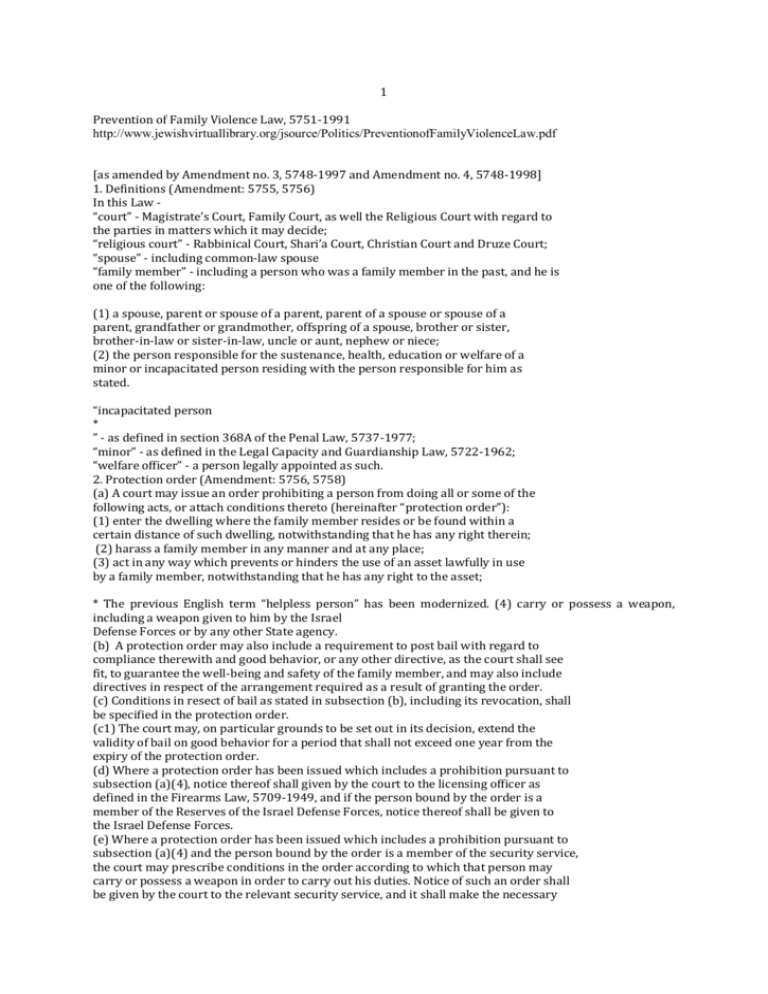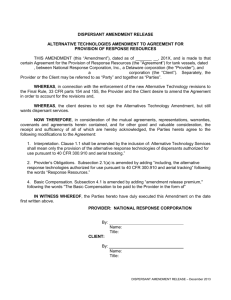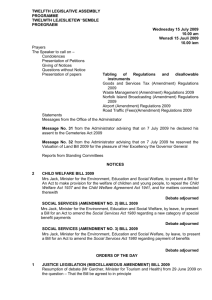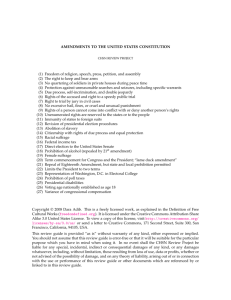
1
Prevention of Family Violence Law, 5751-1991
http://www.jewishvirtuallibrary.org/jsource/Politics/PreventionofFamilyViolenceLaw.pdf
[as amended by Amendment no. 3, 5748-1997 and Amendment no. 4, 5748-1998]
1. Definitions (Amendment: 5755, 5756)
In this Law “court” - Magistrate’s Court, Family Court, as well the Religious Court with regard to
the parties in matters which it may decide;
“religious court” - Rabbinical Court, Shari’a Court, Christian Court and Druze Court;
“spouse” - including common-law spouse
“family member” - including a person who was a family member in the past, and he is
one of the following:
(1) a spouse, parent or spouse of a parent, parent of a spouse or spouse of a
parent, grandfather or grandmother, offspring of a spouse, brother or sister,
brother-in-law or sister-in-law, uncle or aunt, nephew or niece;
(2) the person responsible for the sustenance, health, education or welfare of a
minor or incapacitated person residing with the person responsible for him as
stated.
“incapacitated person
*
” - as defined in section 368A of the Penal Law, 5737-1977;
“minor” - as defined in the Legal Capacity and Guardianship Law, 5722-1962;
“welfare officer” - a person legally appointed as such.
2. Protection order (Amendment: 5756, 5758)
(a) A court may issue an order prohibiting a person from doing all or some of the
following acts, or attach conditions thereto (hereinafter “protection order”):
(1) enter the dwelling where the family member resides or be found within a
certain distance of such dwelling, notwithstanding that he has any right therein;
(2) harass a family member in any manner and at any place;
(3) act in any way which prevents or hinders the use of an asset lawfully in use
by a family member, notwithstanding that he has any right to the asset;
* The previous English term “helpless person” has been modernized. (4) carry or possess a weapon,
including a weapon given to him by the Israel
Defense Forces or by any other State agency.
(b) A protection order may also include a requirement to post bail with regard to
compliance therewith and good behavior, or any other directive, as the court shall see
fit, to guarantee the well-being and safety of the family member, and may also include
directives in respect of the arrangement required as a result of granting the order.
(c) Conditions in resect of bail as stated in subsection (b), including its revocation, shall
be specified in the protection order.
(c1) The court may, on particular grounds to be set out in its decision, extend the
validity of bail on good behavior for a period that shall not exceed one year from the
expiry of the protection order.
(d) Where a protection order has been issued which includes a prohibition pursuant to
subsection (a)(4), notice thereof shall given by the court to the licensing officer as
defined in the Firearms Law, 5709-1949, and if the person bound by the order is a
member of the Reserves of the Israel Defense Forces, notice thereof shall be given to
the Israel Defense Forces.
(e) Where a protection order has been issued which includes a prohibition pursuant to
subsection (a)(4) and the person bound by the order is a member of the security service,
the court may prescribe conditions in the order according to which that person may
carry or possess a weapon in order to carry out his duties. Notice of such an order shall
be given by the court to the relevant security service, and it shall make the necessary
2
arrangements to ensure compliance with the order. For the purposes of this section,
“member of the service” is a member of the Israel Police Force, the Prison Service or
General Security Service or a soldier as defined in the Articles of War Law, 5716-1955.
(f) Where a protection order has been issued which does not include a prohibition
pursuant to subsection (a)(4), the court shall specify the grounds for not including the
said prohibition in the order.
(g) (1) Where a protection order has been issued for the protection of a minor,
notice thereof shall be given by the court to the welfare officer within the
meaning of the Youth (Care and Supervision) Law, 5720-1960.
(2) Where a protection order has been issued for the protection of a minor, the
court may order the welfare officer, as set out in paragraph (1), to file a written
report at the time it sets out.
(3) Where a protection order has been issued for the protection of a minor as set
out in subsection (a)1 in respect of the person responsible for the minor, the
court shall order the welfare officer as set out in paragraph (1) to file a report
with the court. The said report shall be filed within 30 days and the welfare
officer shall state his position regarding, among other things, regarding the existence of the possibility of
maintaining a connection between the minor and
the person responsible for the minor.
(4) If it is the opinion of the court, based on the report as set out in paragraph
(3), that maintaining the connection between the person responsible for the
minor in respect of whom the protection order was issued falls in line with the
good of the minor, it may grant orders in the matter.
(h) Where a protection order has been issued for the protection of a minor as set out in
subsection (a)1 in respect of the person responsible for the minor and the purpose of the
order is not to protect the minor, the court may order maintaining the connection
between the person and the minor, but only where it is convinced, on the basis of the
report pursuant to the provisions of section 6 or otherwise, that there will not be harm to
the minor.
(i) In respect of this section, “responsible for a minor” means a parent, step-parent,
guardian, or one who has the care and custody of the minor.
2A. Undertaking to obtain treatment (Amendment: 5756)
(a) Where a protection order has been granted, the court may, upon issuing the order or
at a later time, order the person to whom the order applies to give an undertaking that he
shall obtain treatment from a person to be determined by the court (hereinafter in this
clause “undertaking to obtain treatment”).
(b) The court shall not order an undertaking to obtain treatment unless a report as stated
in section 6 was filed with the court as stated in section 6, and the court is convinced
that the person to whom the protection order applies is suitable for the treatment as well
as agrees to and understands the terms and the nature of the treatment, and there is a
framework for treating him.
(c) Where the court has ordered an undertaking to obtain treatment, it shall order the
submission of a report to the court regarding progress of the treatment, at such times
and in the manner it determines.
3. Application to grant a protection order and conditions for granting the same
(Amendment: 5756, 5758)
At the request of a family member, the Attorney General or his representative, a police
prosecutor or welfare officer nominated pursuant to the Youth (Care and Supervision)
Law, 5720-1960, the court may grant a protection order against a person if it sees that
one of the following has occurred:
(1) shortly before the petition was filed the person acted violently against a family
member, committed a sexual offense against him or unlawfully detained him;
(2) his behavior constitutes a reasonable basis for assuming that he poses a substantial
physical threat to a family member he may commit a sexual offense against him; (3) where he has
committed continuous mental abuse or behaved in a manner which
does not permit a family member to run his life is a reasonable and proper manner.
3
For the purposes of this section, “sexual offense” means offense pursuant to Article
Five of Chapter Ten of the Penal Law, 5737-1977.
4. Procedure (Amendment: 5758)
(a) The court may grant a protection order ex-parte; where an ex-parte order has been
granted the hearing in the presence of both parties shall be conducted as soon as
possible and no later than seven days from the granting of the order.
(b) Where a hearing is held as stated in subsection (a), the court may extend the validity
of the order as stated in section 5, cancel it or insert changes in it, even if the person to
whom the order applies is not present at the hearing.
(c) Notwithstanding subsection (a), an order as stated in section 3(3) shall be granted
only with both parties present, unless the respondent has been legally served at is not
present at the hearing.
5. Period of validity (Amendment: 5758)
The validity of a protection order shall not exceed three months. The court may extend
the validity of the order from time to time, provided that the total period shall not
exceed six months. However, on special grounds to be specified in its decision, it may
extend the validity of the order for a total period not to exceed one year.
6. Report (Amendment: 5758)
For the purpose of procedure pursuant to clause 4(b), the court may order a welfare
officer to prepare a written report by the time it shall adjudicate in any matter relating to
a protection order, and the provisions of the Welfare (Procedure Regarding Minors,
Mentally-ill and Missing Persons) Law, 5716-1955, shall apply, mutatis mutandis, even
if report is requested regarding someone not included in the said Law.
7. Breaching an order (Amendment: 5758)
(a) Abrogated
(b) Where a complaint has been filed with the police in respect of the breach a
protection order which includes a prohibition pursuant to section 2(a)(1), a police
officer may arrest the offender.
(c) It shall not be a valid defense for one who has violated a protection order to claim
that his family members did not insist on its compliance or the operation of the Law as a
result of the breach. 8. Rules of evidence (Amendment: 5755)
(a) In proceedings pursuant to this Law, the provisions of sections 3 and 4 of the
Evidence Ordinance (New Version), 5731-1971, shall not apply.
(b) The provisions of the Family Courts law, 5765-1995, shall apply to the Magistrate’s
Court hearing a claim pursuant to this Law.
9. Methods of furnishing
Court documents and orders pursuant to this Law shall be furnished by a clerk of the
court or by one authorized in writing by a court of the director of the courts; however, a
family member of a party to proceedings or anyone on his behalf shall not be authorized
unless it is his lawyer, if he agrees to it.
10. Jurisdiction
In a proceeding under this Law, the court may not be precluded from considering or
providing relief in the matter on the basis that it is being heard in another proceeding or
on the basis that a family member waived his right pursuant to this Law or for another
reason.
11. Costs and damages
Where the court has dismissed a claim to grant a protection order as vexatious, it may
impose on the person who sought the protection order all or part of the following:
(1) Costs in favor of the State and the aggrieved party, at such rate as it sees fit;
(2) Adequate damages to the party aggrieved by the filing of the petition.
12. Observance of laws
The provisions of this Law are in addition to the provisions of any law and do not
derogate from them.
13. Implementation and regulations (Amendment: 5756(2))
(a) The Minister of Justice is responsible for the implementation of this Law and he may
make regulation regarding anything related to its implementation.
(b) The Minister for Religious Affairs, with the consent of the Minister of Justice, may
4
make regulations as set out in subsection (a), for all religious courts, mutatis mutandis.
14. Amendment to the Youth (Care and Supervision) Law
In the Youth (Care and Supervision) Law, 5720-1960, the following shall be inserted
after section 3: 3A. “Protection order
The court seized with a matter in respect of a minor may, if it views it as necessary,
issue a protection order pursuant to the Prevention of Family Violence Law, 57511991”.
15. Amendment to the Criminal Procedure Law
In the Criminal Procedure Law (Consolidated Version), 5742-1982, at the end of
section 44, there shall be added “the court may also grant a protection order as stated in
the Prevention of Family Violence Law, 5751-1991”.
16. Commencement
This Law shall come into force 90 days from the day of its publication.
Yitzchak Shamir Dan Meridor
Minister of Justice
Prime Minister
Chaim Herzog Dov Shilansky
President Speaker of the Knesset







